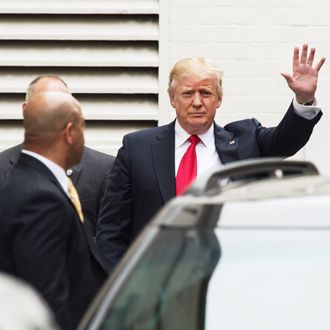
One week after Paul Ryan said he wasn’t “ready” to support his party’s presumptive nominee — while the Donald declared his resistance to “Paul Ryan’s agenda” — the two leaders emerged from their much-hyped Thursday meeting with a sunny joint statement in tow.
While the two recognized their differences on things like trade policy and the propriety of menstruation jokes, they found common cause in their opposition to Crooked Hillary, and deemed the meeting “a very positive step towards unification.”
“I think that we had a very encouraging meeting,” Ryan told reporters at a post-confab press conference. “It’s no secret that Donald Trump and I have our differences. The question is: What is it that we need to do to unify the Republican Party?”
Ryan emphasized that the GOP’s presidential nominee and its House Speaker need not agree on every area of policy, but that agreement on “core principles” is a prerequisite for party unity. On that count, Ryan said that Trump voiced a heartening commitment to the Constitution, outlawing abortion, and the separation of powers. Ryan repeated that final point multiple times in his remarks, suggesting that Trump’s authoritarian bent was, appropriately, one of the Speaker’s central concerns. Still, Ryan conspicuously withheld his endorsement while indicating that he and Trump would meet again in the future, to explore how their shared principles should shape the GOP’s policy agenda.
“It’s very important that we don’t pretend unification, but that we truly and actually unify,” Ryan said.
Trump had offered Ryan several olive branches or, at least, olive twigs in the lead-up to Thursday’s meeting. On Monday, Trump said he’d always liked the congressman and disavowed Sarah Palin’s proposal that Speaker RINO be primaried. On Wednesday, Team Trump announced that two supply-side quacks in good standing were revising the nominee’s tax plan so that it would explode the deficit in a more responsible, mainstream manner. Later that afternoon, Trump’s chief policy adviser told The Wall Street Journal that Trump didn’t really mean it when he promised not to cut Medicare and Social Security.
For his part, Ryan said Wednesday that he would like to see “all conservatives rally together to win this election and defeat Hillary Clinton.” However, the Speaker warned that said rallying might not happen for some time, telling the Journal, “It was a very, very bitter, divisive primary. It’s going to take more than a week just to repair and unify this party.”
Trump went on to meet with other House heavyweights on Thursday, including Majority Leader Kevin McCarthy of California, one of Trump’s most enthusiastic backers in the lower chamber. He is also expected to meet with Mitch McConnell and the GOP Senate leadership later in the day.
The Donald’s nomination has not made it any easier for Ryan to manage the disparate factions in his caucus. Representatives in purple districts don’t want their party to be branded with the gold-plated name of a xenophobic demagogue, and were grateful for Ryan’s declaration of ambivalence. But members from with safe red seats — recognizing that Trump’s base is their own — bristled at the Speaker’s reluctance to make America great again.
What’s more, Ryan’s political future may depend on how deftly he navigates the catch-22 that Trump presents: If he embraces the Donald too more warmly, Ryan risks tainting his brand as the GOP’s most principled champion of austerity; if he gives the Donald the cold shoulder, he could alienate the majority of Republican voters who think Trump is a perfectly fine standard-bearer. On Wednesday, Public Policy Polling found that 44 percent of Republicans now disapprove of Ryan’s performance as Speaker, while only 40 percent give the Wisconsinite a thumbs-up.






























